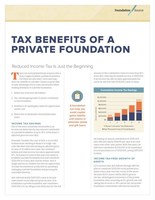FAIRFIELD, Conn., Feb. 12, 2020 /PRNewswire/ -- As the April 15th tax filing deadline looms, people are thinking about how to reduce their taxes for next year. That's why, for many philanthropic high-net-worth individuals, the significant financial benefits of establishing a private foundation might be especially compelling right now, says Jeffrey Haskell, chief legal officer of Foundation Source, the nation's largest private foundation management firm.
"Suppose an individual has highly appreciated stock that he or she is reluctant to sell because of the capital gains implications or has an under-diversified portfolio that's doing little for him or her," said Haskell. "If this individual establishes a private foundation, he or she can donate those appreciated and unproductive assets to it, sell them in a tax-advantaged environment, and reinvest the proceeds for a higher return. The subsequent investment earnings can then be used to make grants to charities."
Giving to a private foundation may make it possible for individuals to:
- Reduce their income tax liability for each year in which they make a contribution;
- Avoid capital gains taxes, depending on the assets contributed;
- Increase the foundation's endowment through tax-advantaged growth and compounding; and
- Reduce or eliminate potential estate taxes.
Income Tax Savings
One of the immediate benefits for contributing to a private foundation is an income tax deduction of up to 30 percent of the donor's adjusted gross income (AGI). The donor receives a tax deduction up front and can make charitable deductions over time, enabling him or her to give strategically instead of in the usual year-end rush.
Capital Gains Tax Savings
A donor may also be able to avoid paying capital gains taxes by donating highly appreciated assets to his or her private foundation. For example, if a donor were to give appreciated stock held over a year to the foundation, the donor would be entitled to receive an income tax deduction for the full, fair-market value of the stock. If the foundation sells the stock in the future, it will pay only the nominal excise tax of 1.39% on the net capital gains.
Tax-Advantaged Growth of Assets
Because the funds contributed to a private foundation are able to grow in a tax-advantaged environment, over the years, the foundation's assets will likely exceed the total amount of the donor's contributions. The result will be a significant charitable legacy that the donor's heirs can continue to control and pass to future generations in perpetuity.
Estate Tax Savings
Assets contributed to a private foundation are excluded from the donor's estate; thereby not subject to federal or state estate taxes. For high-net-worth individuals who have a strong charitable interest, private foundations offer an opportunity to avoid paying estate taxes while simultaneously creating an enduring philanthropic legacy.
For more information on the tax benefits of private foundations, visit here.
For more information on starting a private foundation, visit Foundation Source.
About Foundation Source (www.foundationsource.com)
Foundation Source is the nation's largest provider of comprehensive support services for private foundations. Our complete outsourced solution includes foundation creation (as needed), administrative support, active compliance monitoring, philanthropic advisory, tax and legal expertise, and online foundation management tools.
Approaching our third decade, Foundation Source provides its services to more than 1,650 family, corporate, and professionally staffed foundations, of all sizes, nationwide. We work in partnership with wealth management firms, law firms, accounting firms, and family offices as well as directly with individuals and families. Foundation Source is headquartered in Fairfield, Connecticut.
SOURCE Foundation Source

Related Links
WANT YOUR COMPANY'S NEWS FEATURED ON PRNEWSWIRE.COM?
Newsrooms &
Influencers
Digital Media
Outlets
Journalists
Opted In





Share this article